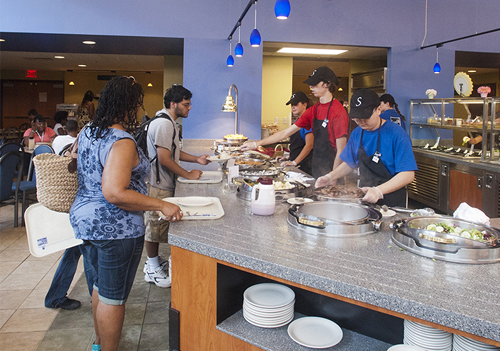
US columnist RICHARD MOUW, in an article first published by Religion News Services, reflects on changes in the way we eat…
Via RNS
When I became an academic administrator in the early 1990s I had to pay attention to topics that I had never thought about before. For example, during my previous three decades as a full-time faculty member, I don’t think I ever heard any colleague use the phrase “auxiliary services” – a reference to such campus functions as housing, cafeterias, and bookstores. So, knowing that I had a lot to learn – the vice president for auxiliary services now reported to me on a regular basis – I attended a professional conference on the subject.

Penn State Housing and Food Services staff serve lunch to students at the all you can eat ‘South Side Buffet’ in Redifer Commons on the University Park campus. PICTURE: Creative Commons/Penn State/Patrick Mansell
“The family meal serves as an important early workshop in civility. It is where we learn our manners. Sitting for a half-hour or so at a table where we are sharing food with people with whom we may be quite irritated – this is a good learning exercise for later getting along with fellow citizens with whom we disagree about important matters.”
The memorable session at that conference was for me a seminar on food services for students. The presenter talked about a recent shift in campus culture from “dining” to “grazing”. In my own undergraduate days, for example, we students ate our meals sitting at tables in dining halls, where we engaged in meal-long conversations while servers brought us our food. These days campus food services are typically organized around what the presenter called “grazing stations”. A student goes to the salad bar and sits briefly at a table with, at best, brief social interactions. Next comes the make-your-own sandwich line, or the hot meal station. Then dessert is a stop at the frozen yogurt machine, for a cone to be eaten on the way to the next class.
I have to admit that the quality of food is better these days than my own student experience decades ago. And it is pleasant to have the many “grazing” choices. But something also has been lost.
Many students these days come from homes where grazing is a fact of life. Family members live busy lives, and on most days sitting at a meal together is not possible. Meals are often eaten while surfing on an iPhone, or sitting in front of a TV set.
I discuss this pattern in the frequent talks that I give about civility to church groups, campus gatherings and pastors’ conferences. The word “civility” comes from civitas, the Latin word referring to the ancient city-state. The Greek philosopher Aristotle taught that we don’t properly mature as adult humans until we learn to act in the city’s public square, respecting people whom we encounter there simply because they are our fellow human beings. To reach that stage, Aristotle said, we must first learn to bond with others in kinship – as small children with our own family members. Then we transfer that sense of belonging into friendships. After learning those lessons in close relationships we can cultivate the respect due to strangers whom we encounter in public spaces.
Here’s a practical application to eating today. The family meal serves as an important early workshop in civility. It is where we learn our manners. Sitting for a half-hour or so at a table where we are sharing food with people with whom we may be quite irritated – this is a good learning exercise for later getting along with fellow citizens with whom we disagree about important matters.
Maybe we can’t go back to those traditional family meals of the past, the kind depicted in the old Norman Rockwell paintings. We may need to find new occasions for dining together: sit-down dinners on special occasions on campuses, the church pot-luck, convening in restaurants for more than a “quick bite,” one-night-a-week compulsory family meals (with no smart phones allowed!). Creative scheduling of intentional breaks that we take from our rounds of grazing events is more than an exercise in nostalgia. It can be an important step toward promoting a much needed infusion of civility into our public lives.
Richard J Mouw is a US-based theologian, philosopher, scholar, educator and author and professor of faith and public life at Pasadena, California-based Fuller Theological Seminary.





